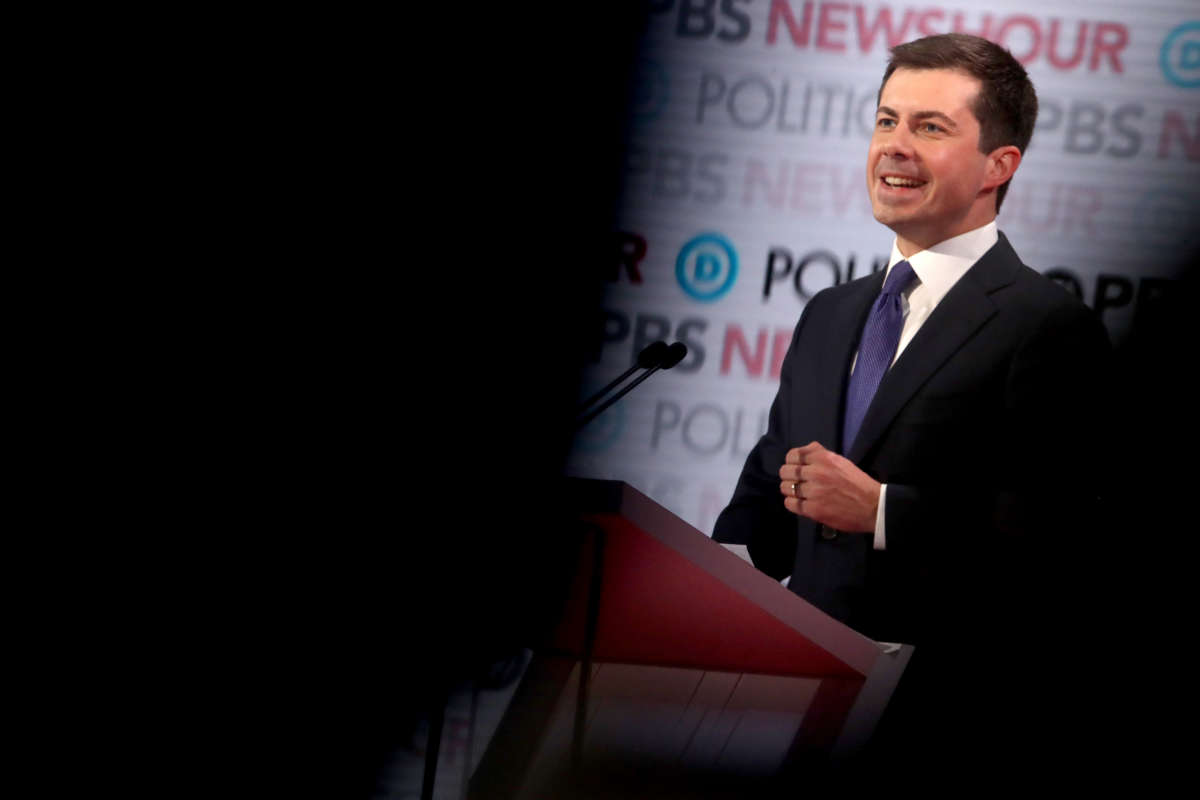Support justice-driven, accurate and transparent news — make a quick donation to Truthout today!
An email exchange reviewed by Axios showed a top fundraiser for Pete Buttigieg offering a rich prospective donor access to the South Bend, Indiana mayor’s presidential campaign in return for donations, an overture critics described as a particularly blatant example of how big money corrupts the American political system.
H.K. Park — who, according to Buttigieg’s website, has raised at least $25,000 for the campaign — told a potential donor in a recent email that “[i]f you want to get on the campaign’s radar now before he is flooded with donations after winning Iowa and New Hampshire, you can use the link below for donations.”
As Axios reported late Sunday, Park’s offer “was unusually blunt — even by modern pay-to-play standards.”
“Pretty brazen stuff,” tweeted The Intercept’s Mehdi Hasan.
For campaign finance watchdogs and reform advocates, the email is indicative of the way in which wealthy donors buy access to and influence over presidential candidates — in this case, before a single vote has been cast.
Brendan Fischer, federal reform program director at the the Campaign Legal Center, told Axios that Park’s email “is an example of a campaign offering potential donors an opportunity to buy influence.”
“It’s rare that the public has an opportunity to see it in writing,” said Fischer, “but this is not the only campaign that’s offering big donors the opportunity to get on the radar of the candidate in exchange for large contributions.”
Even the prospective donor, who Axios did not name, expressed alarm about Park’s offer.
“It’s very telling and concerning that one of the campaign’s major bundlers would talk like that,” the individual told Axios. “What would this suggest about the way he’s going to interact with Silicon Valley if the implication is pay-for-play? If that’s the way he’s operating, it’s in the public interest for people to know what’s being said.”
Big scoop from @axios: Pete bundler HK Park, from the defense consulting firm Cohen Group where Buttigieg worked, used the promise of increased influence to lure big donors, according to email https://t.co/wvAaZSyhHL
— Ryan Grim (@ryangrim) December 23, 2019
Shaun King, a supporter of 2020 presidential candidate Sen. Bernie Sanders (I-Vt.), tweeted that the email shows Buttigieg’s campaign finance problems go “far beyond wine caves,” referring to the mayor’s ritzy fundraiser last week in Napa Valley, California.
“Pete’s fat-cat mega-donors are telling each other that if you donate big money to his campaign, it gives you access and influence,” King said. “And of course it does. That’s why they give it. And why it’s a problem.”
In response to Axios‘ reporting, Buttigieg spokesperson Sean Savett said the campaign “did not see or authorize the language in this email.”
“But it is ridiculous to interpret it as anything more than asking potential supporters who may be interested in Pete to join our campaign before caucusing and voting begins,” added Savett. “We are proud to have more than 700,000 donors who have already donated to our campaign, and the only promise any donor will ever get from Pete is that he will use their donations to defeat Donald Trump.”
Slate journalist Ashley Feinberg ridiculed Savett’s depiction of the exchange as nothing more than an innocuous offer to “join” the campaign.
this isn't even a good lie? it's literally right there! we can read it! https://t.co/q2tKQsxOsu pic.twitter.com/AMQL198Xap
— Ashley Feinberg (ashleyfeinberg.bsky.social) (@ashleyfeinberg) December 23, 2019
The email was revealed just days after Buttigieg’s rivals for the 2020 Democratic presidential nomination criticized the mayor’s big-money fundraising during the primary debate in Los Angeles.
“Billionaires in wine caves should not pick the next president of the United States,” said Sen. Elizabeth Warren (D-Mass.). “If you can’t stand up and take the steps that are relatively easy… then how can the American people believe you’re going to stand up to the wealthy and well-connected when you’re president and it’s really hard?”
Sanders pointed to the number of billionaires that have donated to Buttigieg’s campaign and said, “This is why three people own more wealth than the bottom half.”
“We need to get money out of politics,” said Sanders. “We should run our campaigns on that basis.”
Media that fights fascism
Truthout is funded almost entirely by readers — that’s why we can speak truth to power and cut against the mainstream narrative. But independent journalists at Truthout face mounting political repression under Trump.
We rely on your support to survive McCarthyist censorship. Please make a tax-deductible one-time or monthly donation.
